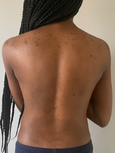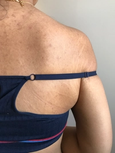Your hair care products might be the cause of neck and back acne
If you've been struggling with persistent acne on your back, neck, or even the sides of your face, you may have overlooked a potential cause: your hair care products. While skincare routines are often the focus when addressing breakouts, the products we use on our hair can also significantly impact the condition of our skin.
This type of acne is known as acne cosmetica, and it specifically refers to breakouts caused by products that come into contact with the skin hair. It's a common issue for those using hair care products with comedogenic ingredients, which are known to be more likely to clog pores, especially if they touch your skin frequently and for long periods of time.
How Hair Products Contribute to Acne
1. Oils
Many hair care products, particularly conditioners and styling products, contain oils and emollients that can clog pores and lead to acne. These ingredients, such as argan oil, moroccan oil, and coconut oil, are often used to smooth and moisturize the hair. However, when these products come into contact with the skin, especially on the face, back, and neck, they can transfer from the hair and block the pores.
2. Sulfates
Sulfates are common lathering agents found in shampoos. While they effectively cleanse the hair and scalp, they can also be harsh on the skin if not completely rinsed away, potentially leading to irritation and dryness. This can trigger overproduction of sebum, which can clog pores and result in acne.
3. Fragrances
Artificial fragrances, often listed as "parfum" or "fragrance" on product labels, are common ingredients in hair care products. When hair products containing artificial fragrances come into contact with the skin, they can exacerbate existing breakouts or trigger new ones, especially for those with sensitive or acne-prone skin.
Preventing Acne Caused by Hair Products
To minimize the risk of haircare -related acne, consider the following tips:
1. Choose non-comedogenic products: Opt for hair care products labeled as "non-comedogenic," "oil-free," or "won't clog pores."* These formulations are designed to provide the benefits your hair needs while minimizing the chance of acne. Consulting with your derm on common cloggers and checking the ingredients list for them when shopping for new products is a good starting point.
2. Avoid skin contact during hair treatments: When applying hair conditioners, masks, glossing treatments, or leave-in styling products, clip your hair up to prevent the product from coming into direct contact with your facial and body skin.
3. Rinse thoroughly: Ensure that you rinse out shampoos and conditioners completely to avoid leaving behind residue that could sit on your skin.
4. Avoid artificial fragrances: If you have sensitive or acne-prone skin, consider using fragrance-free haircare to reduce the risk of potential irritation and breakouts.
References:
- Bondi CAM, Marks JL, Wroblewski LB, Raatikainen HS, Lenox SR, Gebhardt KE. Human and Environmental Toxicity of Sodium Lauryl Sulfate (SLS): Evidence for Safe Use in Household Cleaning Products. Environmental Health Insights. 2015;9.
- Shampoos - Medscape - Mar 01, 2009.
Body Acne
Breakouts that occur in areas with high concentrations of oil glands.
Also Called
Bacne, blackheads, pimples, pustules, “ass”-ne
Frequently Found On
Back, chest, butt
Related Concerns
Learn More: Body Acne


















